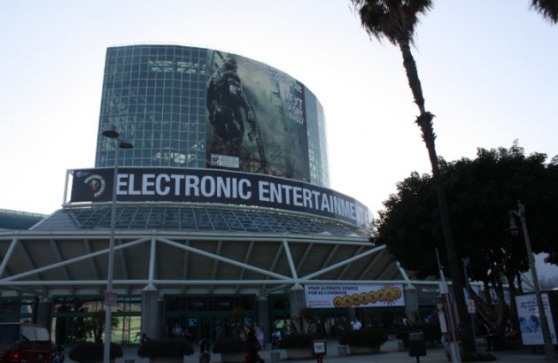
There's a saying about the "me" generation that says we're
"absolutely terrified of someone, somewhere, trying to sell them something." I
disagree, but it's hard not to see how frustrated people can get when a company
reduces their passionate involvement to a number on an accounting sheet. To the
dismay of gamers everywhere, the annual Electronic Entertainment Expo - also
known as E3 - has done just this.
It was hard not to walk away from this year's expo (or in my
case, from the television after hours and hours of coverage) without the bitter aftertaste of the word
"consumer" in one's mouth, especially after Sony Computer and Entertainment
America CEO Jack Tretton referred to fans as such throughout his company's
keynote presentation.
It seems, nowadays, that E3 aims only to create sensational
headlines for investors. But it didn't used to be that way. Although E3 has
historically been a trade show intended for shop owners, investors, and
developers, gamers have also tuned into to every scrap of E3 news they could
get since the expo's inception.
Now, anybody with an Internet connection or cable television
access can watch E3, so audiences have been growing steadily every year. Major
cable networks such as Spike and G4 now broadcast hours of live, commercial-free coverage and
practically every major press outlet, specific to gaming or not, covers E3. Ten
million people, according to a SpikeTV press release, watched some aspect of
that outlet's Expo coverage in 2011, be it through television or streaming on
their computer, and similar numbers were expected this year.
The fan-based gaming press (Kotaku, Destroid, et al.) often do good work covering
the Expo. The national outlets don't do as well; in fact, a CNN tech reporter
didn't even know he was playing a new console when testing it out on the show
floor. So the fans have begun to revolt, and have done so in an ingenious way -
by creating memes out of faults, snafus, and fuck-ups in the keynote press
conferences.
E3 memes aren't a new phenomenon. Say the
words "Ridge Racer" and most
gamers will know you're making fun of Kaz Hirai, the hapless Sony executive who
presented that game at E3 2006. Sometimes the meme-making can be out of love,
like the "my body is ready" quote of Nintendo exec Reggie Fils-Aime's 2007
press conference at E3.
As far as gaffes go, this year might be the
worst yet - which makes it the best year for mockery and memes. For example,
Microsoft's near constant barrage of "incorporate every piece of technology in
your home with Kinect and Smartglass" inspired Trey Parker and Matt Stone to
parody the publisher on their own stage. There was also the popular demo of
Ubisoft's new IP, Watch_Dogs,
being run on a high-end PC instead of a console, leading PC fans to claim the
world as their own. Or, the impossible-to-cast spells of a new motion-based Harry Potter PS3 game that even had
the announcer panicking. Or, one of Ubisoft's hosts being a 2005-era stereotype
of what the company thinks a gamer looks and talks like. Or, developer/bunch of
assholes Crystal Dynamics bragging about the "realism" of their new Tomb Raider title, with the attempted
rapes that the protagonist will have to fight off in the game substituting for
meaningful "character development". Or, Nintendo's parody-worthy videos of a
family enjoying the WiiU together.
Each of these gaffes offers fodder for
great jokes, but underneath the laughter, gamers feel a deep undercurrent of
dissatisfaction with the companies' new technology features and their marketing
strategies. The first two examples feel like gimmicks marketed to casual fans
rather than hardcore gamers - gimmicks that might indeed serve a good purpose
in a home, but which look awful on a big stage. The PC demo only served to
deepen the divide between console gamers and PC gamers, dubbed "the PC master
race" for their superior (expensive) hardware and the issues of class that go
along with it. The demos from Ubisoft, Crystal Dynamics, and Nintendo show
something even more repugnant to this audience of devoted fans, which is that
we're disrespected by the publishers they buy products from, be it through DLC
or DRM or just a plain technology-free insult. It's especially insulting to
female gamers when Lara Croft, one of the strongest female heroines in all of
gaming, becomes the subject of a (presumably male) player's rescue fantasy. And
Nintendo's priorities annoy the hardcore gamers who feel abandoned in favor of *gasp* the average family unit of
consumers. The Wii did well by appealing to families, but when Nintendo tries
to court both the casual and the fanatical audiences at once, the press from
key gaming outlets becomes less than favorable and their stock price drops a
decent amount. No one is left satisfied.
For all of the problems that PAX has had
in the past several years, it still remains a better example of how
interactions between publisher, developer, and gamer should go. Rather than
marketing to gamers with gimmicks or out-of-date stereotypes, the developers
and publishers present themselves to the community and make themselves
available. Questions? Ask them at a panel or after a keynote. Want to try out a
new game or a new system? Get on the floor and wait in line.
E3's unprecedented scale and coverage
should make it a worldwide gathering for everyone in the industry. That would
mean including everyone - even indie games and PC games. Maybe then, E3 could
become something truly great for the industry. But until that happens, fans
will be more than happy to bite the bitter hands that feed us.
















